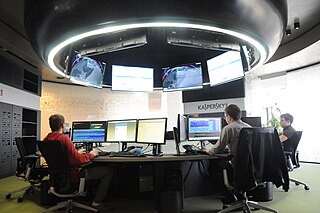Related Research Articles

Computer security is the protection of computer software, systems and networks from threats that may result in unauthorized information disclosure, theft of hardware, software, or data, as well as from the disruption or misdirection of the services they provide.
Cyberterrorism is the use of the Internet to conduct violent acts that result in, or threaten, the loss of life or significant bodily harm, in order to achieve political or ideological gains through threat or intimidation. Emerging alongside the development of information technology, cyberterrorism involves acts of deliberate, large-scale disruption of computer networks, especially of personal computers attached to the Internet by means of tools such as computer viruses, computer worms, phishing, malicious software, hardware methods, and programming scripts can all be forms of internet terrorism. Some authors opt for a very narrow definition of cyberterrorism, relating to deployment by known terrorist organizations of disruption attacks against information systems for the primary purpose of creating alarm, panic, or physical disruption. Other authors prefer a broader definition, which includes cybercrime. Participating in a cyberattack affects the terror threat perception, even if it isn't done with a violent approach. By some definitions, it might be difficult to distinguish which instances of online activities are cyberterrorism or cybercrime.
Ransomware is a type of malware that permanently blocks access to the victim's personal data unless a "ransom" is paid. While some simple ransomware may lock the system without damaging any files, more advanced malware uses a technique called cryptoviral extortion. It encrypts the victim's files, making them inaccessible, and demands a ransom payment to decrypt them. In a properly implemented cryptoviral extortion attack, recovering the files without the decryption key is an intractable problem, and difficult-to-trace digital currencies such as paysafecard or Bitcoin and other cryptocurrencies are used for the ransoms, making tracing and prosecuting the perpetrators difficult.

Cyberwarfare is the use of cyber attacks against an enemy state, causing comparable harm to actual warfare and/or disrupting vital computer systems. Some intended outcomes could be espionage, sabotage, propaganda, manipulation or economic warfare.
Triconex is a Schneider Electric brand that supplies products, systems, and services for safety, critical control, and turbo-machinery applications. Triconex also use its name for its hardware devices that use its TriStation application software. Triconex products are based on patented Triple modular redundancy (TMR) industrial safety-shutdown technology. Today, Triconex TMR products operate globally in more than 11,500 installations.
A supply chain attack is a cyber-attack that seeks to damage an organization by targeting less secure elements in the supply chain. A supply chain attack can occur in any industry, from the financial sector, oil industry, to a government sector. A supply chain attack can happen in software or hardware. Cybercriminals typically tamper with the manufacturing or distribution of a product by installing malware or hardware-based spying components. Symantec's 2019 Internet Security Threat Report states that supply chain attacks increased by 78 percent in 2018.
Cyberwarfare by Russia includes denial of service attacks, hacker attacks, dissemination of disinformation and propaganda, participation of state-sponsored teams in political blogs, internet surveillance using SORM technology, persecution of cyber-dissidents and other active measures. According to investigative journalist Andrei Soldatov, some of these activities were coordinated by the Russian signals intelligence, which was part of the FSB and formerly a part of the 16th KGB department. An analysis by the Defense Intelligence Agency in 2017 outlines Russia's view of "Information Countermeasures" or IPb as "strategically decisive and critically important to control its domestic populace and influence adversary states", dividing 'Information Countermeasures' into two categories of "Informational-Technical" and "Informational-Psychological" groups. The former encompasses network operations relating to defense, attack, and exploitation and the latter to "attempts to change people's behavior or beliefs in favor of Russian governmental objectives."

Kaspersky Lab is a Russian multinational cybersecurity and anti-virus provider headquartered in Moscow, Russia, and operated by a holding company in the United Kingdom. It was founded in 1997 by Eugene Kaspersky, Natalya Kaspersky and Alexey De-Monderik. Kaspersky Lab develops and sells antivirus, internet security, password management, endpoint security, and other cybersecurity products and services.
Stuxnet is a malicious computer worm first uncovered in 2010 and thought to have been in development since at least 2005. Stuxnet targets supervisory control and data acquisition (SCADA) systems and is believed to be responsible for causing substantial damage to the nuclear program of Iran. Although neither country has openly admitted responsibility, multiple independent news organizations recognize Stuxnet to be a cyberweapon built jointly by the United States and Israel in a collaborative effort known as Operation Olympic Games. The program, started during the Bush administration, was rapidly expanded within the first months of Barack Obama's presidency.
Flame, also known as Flamer, sKyWIper, and Skywiper, is modular computer malware discovered in 2012 that attacks computers running the Microsoft Windows operating system. The program is used for targeted cyber espionage in Middle Eastern countries.
Shamoon, also known as W32.DistTrack, is a modular computer virus that was discovered in 2012, targeting then-recent 32-bit NT kernel versions of Microsoft Windows. The virus was notable due to the destructive nature of the attack and the cost of recovery. Shamoon can spread from an infected machine to other computers on the network. Once a system is infected, the virus continues to compile a list of files from specific locations on the system, upload them to the attacker, and erase them. Finally the virus overwrites the master boot record of the infected computer, making it unusable.

Palo Alto Networks, Inc. is an American multinational cybersecurity company with headquarters in Santa Clara, California. The core product is a platform that includes advanced firewalls and cloud-based offerings that extend those firewalls to cover other aspects of security. The company serves over 70,000 organizations in over 150 countries, including 85 of the Fortune 100. It is home to the Unit 42 threat research team and hosts the Ignite cybersecurity conference. It is a partner organization of the World Economic Forum.

Seculert was a cloud-based cyber security technology company based in Petah Tikva, Israel. The company's technology was designed to detect breaches and advanced persistent threats (APTs), attacking networks. Seculert's business was based on malware research and the ability to uncover malware that has gone undetected by other traditional measures.
The vulnerability of nuclear plants to deliberate attack is of concern in the area of nuclear safety and security. Nuclear power plants, civilian research reactors, certain naval fuel facilities, uranium enrichment plants, fuel fabrication plants, and even potentially uranium mines are vulnerable to attacks which could lead to widespread radioactive contamination. The attack threat is of several general types: commando-like ground-based attacks on equipment which if disabled could lead to a reactor core meltdown or widespread dispersal of radioactivity; external attacks such as an aircraft crash into a reactor complex, or cyber attacks.
Regin is a sophisticated malware and hacking toolkit used by United States' National Security Agency (NSA) and its British counterpart, the Government Communications Headquarters (GCHQ). It was first publicly revealed by Kaspersky Lab, Symantec, and The Intercept in November 2014. The malware targets specific users of Microsoft Windows-based computers and has been linked to the US intelligence-gathering agency NSA and its British counterpart, the GCHQ. The Intercept provided samples of Regin for download, including malware discovered at a Belgian telecommunications provider, Belgacom. Kaspersky Lab says it first became aware of Regin in spring 2012, but some of the earliest samples date from 2003. Among computers infected worldwide by Regin, 28 percent were in Russia, 24 percent in Saudi Arabia, 9 percent each in Mexico and Ireland, and 5 percent in each of India, Afghanistan, Iran, Belgium, Austria, and Pakistan.
Lazarus Group is a hacker group made up of an unknown number of individuals, alleged to be run by the government of North Korea. While not much is known about the Lazarus Group, researchers have attributed many cyberattacks to them since 2010. Originally a criminal group, the group has now been designated as an advanced persistent threat due to intended nature, threat, and wide array of methods used when conducting an operation. Names given by cybersecurity organizations include Hidden Cobra and ZINC or Diamond Sleet. According to North Korean defector Kim Kuk-song, the unit is internally known in North Korea as 414 Liaison Office.

Petya is a family of encrypting malware that was first discovered in 2016. The malware targets Microsoft Windows–based systems, infecting the master boot record to execute a payload that encrypts a hard drive's file system table and prevents Windows from booting. It subsequently demands that the user make a payment in Bitcoin in order to regain access to the system.

A series of powerful cyberattacks using the Petya malware began on 27 June 2017 that swamped websites of Ukrainian organizations, including banks, ministries, newspapers and electricity firms. Similar infections were reported in France, Germany, Italy, Poland, Russia, United Kingdom, the United States and Australia. ESET estimated on 28 June 2017 that 80% of all infections were in Ukraine, with Germany second hardest hit with about 9%. On 28 June 2017, the Ukrainian government stated that the attack was halted. On 30 June 2017, the Associated Press reported experts agreed that Petya was masquerading as ransomware, while it was actually designed to cause maximum damage, with Ukraine being the main target.

Sandworm is an advanced persistent threat operated by Military Unit 74455, a cyberwarfare unit of the GRU, Russia's military intelligence service. Other names for the group, given by cybersecurity researchers, include Telebots, Voodoo Bear, IRIDIUM, Seashell Blizzard, and Iron Viking.
References
- ↑ Franzetti, Davide (26 February 2019). "Oil & Gas Cybersecurity and Process Safety Converge". Security Boulevard.
- 1 2 Gibbs, Samuel (15 December 2017). "Triton: hackers take out safety systems in watershed attack on energy plant". The Guardian. Retrieved 2019-10-12.
- ↑ Giles, Martin (5 March 2019). "Triton is the world's most murderous malware, and it's spreading". Technology Review.
- ↑ Sobczak, Blake (7 March 2019). "The inside story of the world's most dangerous malware". E&E News.
- ↑ "Cos'è Triton, il malware che può causare incidenti catastrofici". Wired Italia (in Italian). 2019-03-08. Retrieved 2023-06-30.